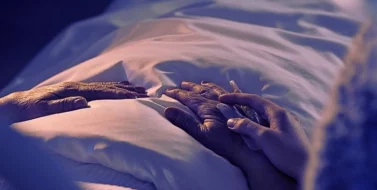Warning signs of elder abuse include sudden changes in behavior or mood, unexplainable financial hardship, malnourishment or poor hygiene, social isolation or restricted communication, and damaged personal belongings.

As people age, they can become physically fragile, making it challenging for them to care for themselves or protect themselves. They may develop health issues that affect their ability to communicate or think clearly, making them vulnerable to abuse. In the US, half a million reports of elder abuse are received each year, with many more going unreported.
Table of Contents
What Is Considered Elder Abuse in Illinois?
Elder abuse refers to any physical, emotional, or sexual harm inflicted upon an older adult. It also includes their financial exploitation and neglect of their welfare by those responsible for their care. In the United States alone, authorities receive over half a million reports of elder abuse every year, while countless more cases go unreported.
Elder abuse is most likely to occur where the senior lives, with adult children, other family members, such as grandchildren, or a spouse or partner being the most common abusers. However, elder abuse can also take place in institutional settings, particularly long-term care facilities.
Statistics on Elder Abuse
Elder abuse is a widespread issue affecting many seniors across the globe. According to a 2017 review of 52 studies in 28 countries, an estimated 15.7% of people aged 60 and older experienced some form of abuse over the preceding year. While the data on abuse in institutional settings such as hospitals and nursing homes is limited, a recent review of studies indicates that 64.2% of staff reported committing abuse within the previous year. Statistics suggest that about 5 million seniors suffer from abuse each year, with approximately 1 in 10 Americans over the age of 60 experiencing some form of elder abuse. It’s important to note that many of these figures are conservative estimates, and the true numbers may be much higher.
Family members, including adult children and spouses, account for 60% of elder abuse incidents. Around two in three staff members at nursing homes or long-term care facilities admit to having committed abuse of the elderly in the past year. Verbal abuse is the most common form of elder abuse, followed by neglect and physical abuse. About 5.2% of older adults report financial abuse by a family member, resulting in losses of $2.9 billion per year. Abused elders have a 300% higher risk of death compared to non-abused elders. Lastly, a 2009 study found that almost 50% of people with dementia experience some kind of abuse.
Different Forms of Elder Abuse
There are various types of elder abuse, which include intimidating or threatening victims, neglecting them, and deceiving them financially. These are the most frequently occurring forms of elder abuse:
Physical Abuse
Physical elder abuse is the intentional use of force that causes physical harm or injury to an elderly person, and can include inappropriate use of drugs, restraints, or confinement.
Signs of physical elder abuse include cuts, bruises, burns, broken bones, dislocated joints, head injuries, and sprains. Warning signs are repeated hospitalization for the same injuries, delayed medical care, suspicious explanations for injuries, and visits to multiple emergency rooms.
If you suspect that an older loved one has been physically abused, make sure to ask their caregivers how the injury happened and whether there is prompt treatment. Any uncertainty could indicate that the injury stems from physical abuse. Physical elder abuse is a serious issue and should not be taken lightly.
Sexual Elder Abuse
Sexual abuse is contact with an elderly person without having consent. This contact can be sex acts. It also includes other activities, like showing pornographic material, or forcing an elderly person to watch sex acts or undress.
Elder Neglect
Neglect is the most common form of elder abuse, making up over 50% of reported cases. Neglect can be intentional or unintentional, and can result from factors such as ignorance or denial of an elderly person’s needs.
Elder neglect is not accidental, but rather the result of carelessness or a lack of concern. Symptoms of neglect in adults include dehydration and malnutrition, dirty or inadequate clothing, insufficient food, lack of required medical aids, poor personal hygiene, unclean or hazardous home or care facility, unpaid bills, untreated injuries or infections, and weight loss.
Neglect can lead to serious health problems, such as bedsores, sepsis, and even death. Neglect is particularly common in assisted living facilities with staffing issues.
Self-Neglect
Self-neglect is a situation where an elderly person is unable to meet basic daily needs. An older person may be suffering from self-neglect if he or she cannot get food or drink without assistance, dress, maintain basic hygiene, keep his or her home in order, manage finances, or take care of medical needs.
Older adults often struggle with accepting that they require assistance or that they are no longer able to care for themselves. However, if an older person has caregivers or lives in a nursing home, then self-neglect should not be happening. In such cases, a caregiver may be committing neglect.
Emotional Abuse
Intentional acts that cause mental pain, fear, or distress to an elder, constitute psychological and emotional abuse. Emotional abuse can take various forms, including belittling, name-calling, and threatening elders. Caregivers may also separate older people from loved ones or resources.
Signs of emotional and psychological abuse in elders include appearing depressed, withdrawn, or scared, avoiding eye contact, changing eating or sleeping patterns, isolating themselves from friends and family, having low self-esteem, experiencing mood swings, and sudden changes in behavior or personality. Emotional and psychological changes may also accompany other types of elder abuse, such as physical harm or neglect.
Financial Abuse
Financial abuse against elders refers to the unauthorized, illegal, or improper usage of their financial resources. The abuse can be carried out by nursing home staff, family members or strangers.
Financial abuse against elders can take various forms, such as:
- Misuse of personal checks, credit cards or accounts belonging to the victim.
- Theft of cash, income checks, or household goods from the victim.
- Forging the elder’s signature for personal gain.
- Identity theft involving the elder’s personal and financial information.
Some warning signs of elder financial abuse include a pattern of missing belongings or property, an elderly person who is unaware of his or her financial situation, canceled checks or bank statements that go to someone other than the elder, changes to an older person’s power of attorney or bank accounts, eviction notices, evidence of unpaid bills, someone showing unusual interest in how much money an elder is spending, and withdrawals the elder could not have made.
It is estimated that financial abuse costs elders around $2.9 billion annually, and it is the most commonly self-reported type of elder abuse.
Signs of Elder Abuse
It’s crucial to be able to identify the typical indications of elder abuse and neglect to guarantee that elderly individuals, including your loved ones, receive the proper care and attention they need.
Unexplained Injuries
One of the most obvious signs of mistreatment or physical abuse is the appearance of bruises, lacerations, broken bones, pressure marks and burns without an apparent cause. Physical abuse can manifest itself in various ways, such as the presence of welts, wounds, unexplained bruises, cuts, burns, and broken bones.
Sudden Changes in Behavior or Mood
When seniors are subjected to emotional abuse, they often show signs of withdrawal, depression, or changes in their alertness and activity levels that cannot be easily explained. Physical, sexual, and emotional abuse can cause them to suddenly distance themselves from social contact or act out in social situations. It can also lead to sleep disturbances, childlike behavior, lack of decisiveness, or depression. Victims of sexual abuse may start talking about new boyfriends or girlfriends or use sexual language that they haven’t used before.
Unexplainable Financial Hardship
Financial abuse of the elderly can take many forms, including altering a will to include the abuser, or making unauthorized purchases using the elderly person’s ATM card, or making the abuser an authorized signer on bank accounts. It’s important to recognize that sudden financial struggles, especially those that were not present before, could be a sign of financial abuse.
Malnourishment or Poor Hygiene
Signs of possible neglect in elders include poor hygiene, unattended medical needs, soiled clothing, severe bedsores, and unusual weight loss. Other indicators of inadequate care may include missed medication doses, inappropriate clothing for the weather, and lack of necessary medical aids such as hearing aids, dentures, and eyeglasses. The dirty little nursing home secret is a lack of proper hand hygiene.
Social Isolation or Restricted Communication
Abusers often take extra steps to prevent seniors from speaking to a loved one they can trust about the abuse. They may refuse to let family members visit the resident alone or restrict the elderly person’s opportunities to speak with others, in order to avoid any chance of the abuse being reported.
Damaged Personal Belongings
Personal items such as eyeglasses, a radio, a TV, a bedside clock, a phone, and clothing may be missing or damaged due to theft, misappropriation, or intentional damage.
How to Report Elder Abuse
If you suspect that someone you know is being abused, whether it’s physical, emotional, or financial abuse, approach them when you are alone and talk to them. Let them know that you are concerned and that you think something is wrong. Offer to help them get assistance from a local adult protective services agency.
It is crucial to report any suspected abuse if you think an older person is being mistreated. Many older adults are too embarrassed to report abuse, or they fear that the abuser will retaliate if they make a report. Therefore, it is essential for family and friends to address any issues.
Resources for Reporting
Illinois has the Adult Protective Services Act. This law ensures that local agencies, which are funded by the Illinois Department on Aging, provide help to individuals aged 60 and above who may be abused, neglected, abandoned, or exploited by their family members, caregivers, or household members.
The Illinois Department of Aging website provides information and hotline numbers to report suspected abuse of adults over 60, and residents living in nursing homes or supportive living facilities. The website provides details on how to report abuse, and the person who makes the report is immune from legal liability and professional disciplinary action. The person’s identity cannot be disclosed unless consent is given or a court orders it.
Certain people must report abuse of a senior if they think that the senior is unable to seek help. These people, called mandated reporters, include social workers, policemen, teachers, and doctors.
Be sure to address any abuse timeously. According to the elder abuse statute of limitations in Illinois, you have 2 years from the time of the abuse to file a lawsuit.
Impact of Neglect on an Elder’s Health and Quality of Life
When an older adult is subjected to abuse, it can have adverse impacts on his or her physical and mental well-being, both short and long-term. These can cause:
- Feelings of depression and anxiety,
- fear or mistrust towards others,
- stress,
- disabling physical injuries, and
- complications arising from untreated or poorly managed health conditions, which are possibly even life-threatening.
Physical wounds may heal with time, but elder abuse can have far-reaching and devastating consequences. It can lead to premature death, cause both physical and psychological harm, destroy social and family ties, and result in devastating financial loss, among other things.
Regardless of the form of mistreatment, the abused person may feel fearful and depressed, and they may even blame themselves for the abuse.
Your elderly relatives, parents, and grandparents deserve to live with dignity and respect. If you suspect that your loved one is in danger, it’s crucial to take action immediately. Contact a nursing home abuse lawyer who can help you report the abuse or get in touch with law enforcement authorities.





